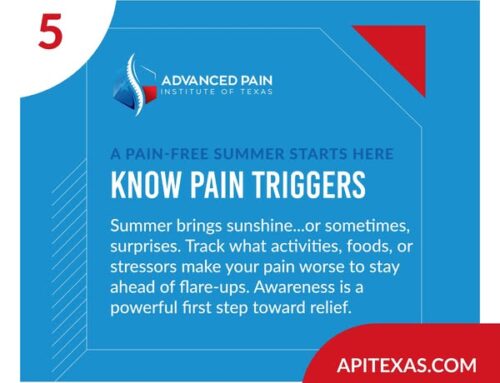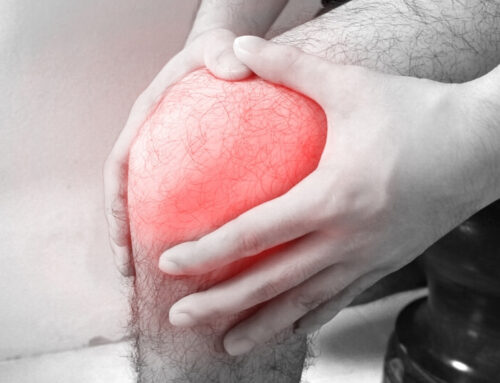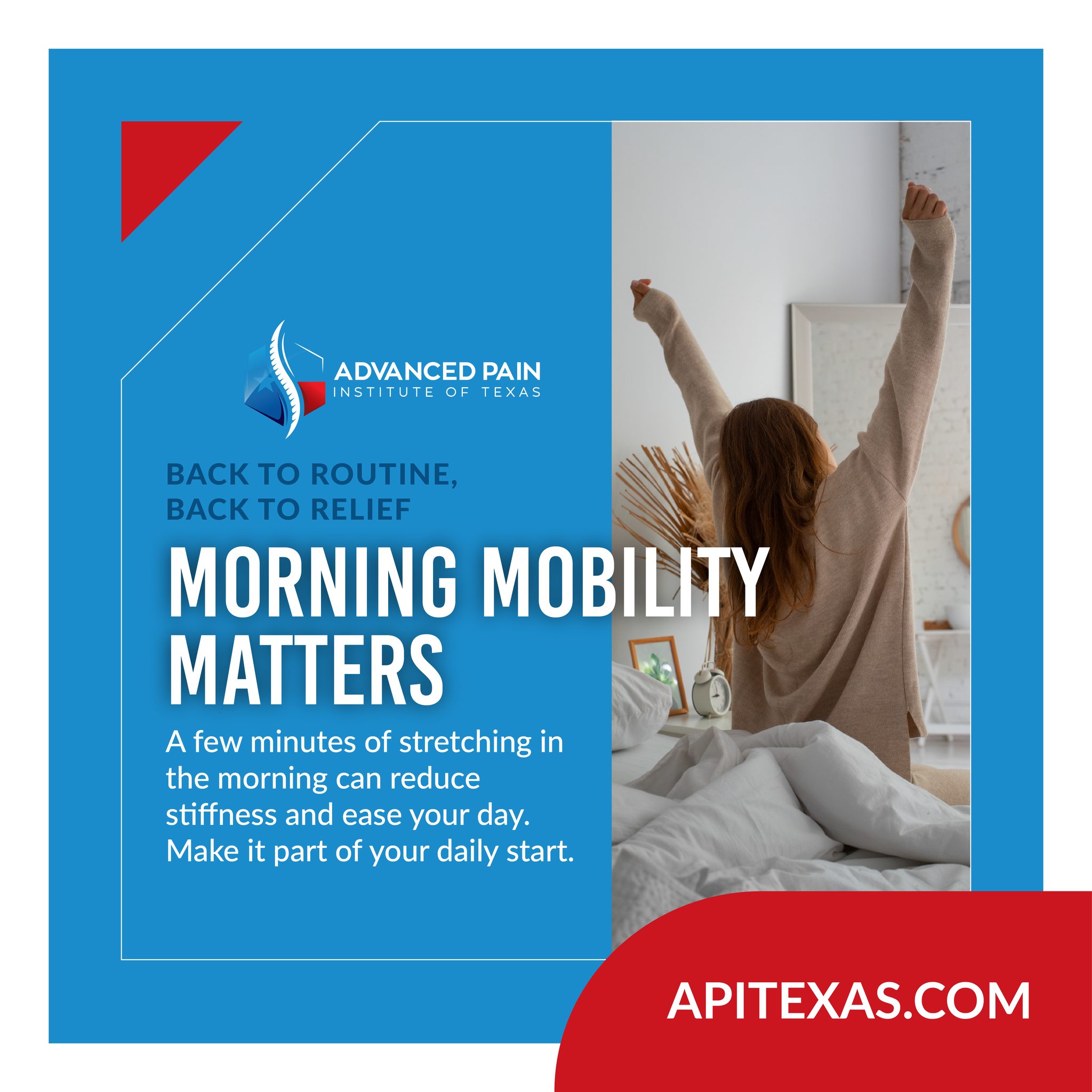
May is Mental Health Month
When it comes to health, we often separate the physical from the mental—but in truth, they’re more connected than we realize. May is Mental Health Month, and it’s the perfect time to explore how mental well-being plays a crucial role in managing chronic pain. This isn’t just about feeling better emotionally; it’s about healing more effectively, regaining control, and living a fuller life. At the Advanced Pain Institute of Texas, the connection between mental health and pain isn’t just acknowledged—it’s central to how they treat patients. Let’s dive into why your mind might just be the most powerful tool in your pain relief toolkit.
Introduction
Why Mental Health Month Matters
Mental Health Month is more than a calendar observance. It’s a national call to action—a time to break down stigma, start conversations, and recognize the immense impact mental health has on every part of our lives, including our physical health. For those struggling with chronic pain, this awareness is even more critical.
According to the CDC, more than 20% of U.S. adults live with chronic pain. Simultaneously, millions also struggle with mental health issues such as anxiety, depression, and PTSD. But these aren’t separate groups. Often, they overlap—because when you’re in pain every day, your emotional well-being takes a hit too.
Mental Health Month gives healthcare providers, like the team at Advanced Pain Institute of Texas, an opportunity to spotlight the importance of treating the whole person. Not just the aching joints or nerve flare-ups—but also the emotional turmoil that often accompanies them.
Connecting Mental Health and Chronic Pain
So how exactly are mental health and pain connected? It comes down to the way our nervous system operates. Pain isn’t just a physical sensation—it’s a signal processed in the brain. And when your brain is overwhelmed by stress, anxiety, or depression, those pain signals can become more intense and persistent.
Let’s say you’re dealing with back pain. If you’re also going through anxiety or depressive episodes, that back pain may feel sharper or more constant. The brain’s pain threshold decreases, meaning what might have once been tolerable becomes excruciating.
Research has consistently shown that people with chronic pain are more likely to experience:
-
Sleep disturbances
-
Emotional burnout
-
Decreased motivation
-
Social withdrawal
-
Suicidal thoughts in severe cases
That’s why comprehensive care is vital. Pain relief isn’t just about injections or physical therapy—it’s about managing the emotional and psychological aspects of pain as well. At Advanced Pain Institute of Texas, this philosophy is central to everything they do.
The Role of Awareness in Healing
Awareness is a powerful thing. Simply acknowledging that your mental state is affecting your pain can be the first step toward healing. Too many people suffer in silence, believing they need to “tough it out” or that their mental distress isn’t serious enough to treat. But here’s the truth: your feelings are valid, and they are just as important to address as your physical symptoms.
At Advanced Pain Institute of Texas, raising awareness is part of the healing journey. Their care teams talk openly with patients about the emotional toll of pain. They ask about your sleep, your mood, your relationships. And then, they build a treatment plan that includes emotional support—because they know that’s often the missing piece in long-term recovery.
During Mental Health Month, this message becomes even more important. If you’re living with chronic pain, take a moment to check in with your mental state. Are you feeling anxious, overwhelmed, or hopeless? If so, you’re not alone—and there is help.
Understanding the Mind-Body Connection
How Emotional Health Impacts Physical Pain
Your brain doesn’t just process emotions—it also interprets pain. This is why emotional distress can amplify physical symptoms. When your mind is under pressure, your body follows suit. Cortisol levels rise, muscles tense, and your nervous system stays in a state of high alert—all of which make pain worse.
There’s even a term for this phenomenon: psychogenic pain. This refers to physical pain that’s linked directly to emotional or psychological factors. For instance, someone with a history of trauma might experience chronic neck pain not because of a physical injury, but because their body is physically holding onto emotional stress.
At Advanced Pain Institute of Texas, they often see patients who come in for physical pain, only to discover that emotional trauma, anxiety, or long-term stress is playing a significant role. The good news? Once you begin to treat both the emotional and physical aspects together, the path to relief becomes clearer and more effective.
Stress, Anxiety, and Pain Sensitivity
If you’ve ever had a tension headache after a long, stressful day, you’ve experienced firsthand how stress influences physical pain. Chronic stress keeps your body in a constant state of “fight or flight.” This raises inflammation, disrupts sleep, and sensitizes your nervous system.
When your anxiety is high, your body literally becomes more sensitive to pain. Things that wouldn’t normally hurt—like light pressure, noise, or temperature changes—can suddenly feel unbearable. This hypersensitivity is especially common in conditions like fibromyalgia, migraines, and neuropathy.
This is why Advanced Pain Institute of Texas incorporates stress management techniques into many of their treatment plans. By learning how to lower your body’s stress response, you can actually reduce your perception of pain. It’s not just about changing how you feel—it’s about changing how your brain processes discomfort.
Depression and Its Effect on Pain Recovery
Depression doesn’t just make you feel sad—it can slow down your body’s ability to heal. People struggling with depression often experience fatigue, lack of motivation, poor appetite, and disrupted sleep. These symptoms not only lower your quality of life—they also get in the way of physical recovery.
Pain and depression create a destructive feedback loop. Pain leads to feelings of helplessness or isolation. Depression leads to inactivity or withdrawal. That inactivity can cause more stiffness, more pain, and less energy. And the cycle continues.
At Advanced Pain Institute of Texas, breaking this loop is a top priority. That’s why mental health screenings are often a part of the initial evaluation. If signs of depression are present, patients are offered resources, therapy options, and in some cases, referrals to mental health professionals. Because real healing means addressing every part of the person.
Chronic Pain: A Mental Health Perspective
How Chronic Pain Can Lead to Psychological Distress
Living with chronic pain isn’t just physically exhausting—it’s emotionally draining, too. When every day is shaped by discomfort, your entire outlook can shift. Activities you once loved become burdens. Relationships get strained. Sleep is interrupted. Eventually, it begins to feel like you’re not just living in pain—you are pain.
It’s no surprise, then, that chronic pain often leads to conditions like depression, anxiety, irritability, and emotional fatigue. Studies show that people with chronic pain are three times more likely to suffer from mood disorders. The constant stress and unpredictability of flare-ups can leave patients feeling powerless and overwhelmed.
At Advanced Pain Institute of Texas, they understand that this emotional toll can be just as serious as the physical pain itself. That’s why their team prioritizes mental health as a fundamental part of pain management. Through counseling, support groups, and integrative therapies, they help patients not just manage pain—but reclaim their mental well-being.
The Vicious Cycle of Pain and Mental Illness
Pain feeds emotional distress, and emotional distress feeds pain—it’s a loop that’s incredibly hard to break without intentional, holistic care. This is known as the pain-depression-anxiety cycle, and here’s how it typically unfolds:
-
Initial Pain: A physical injury or chronic illness causes ongoing pain.
-
Stress Response: The body remains in a heightened state of stress, releasing chemicals like cortisol and adrenaline.
-
Mood Shift: Sleep is disrupted, daily activities become difficult, and the patient becomes less socially active.
-
Mental Health Decline: Depression and anxiety set in, further lowering pain tolerance.
-
Pain Intensifies: Emotional distress magnifies the sensation of pain, causing further physical and emotional decline.
Breaking this cycle requires more than medication. It requires a whole-person approach, like the one practiced at Advanced Pain Institute of Texas. Their integrated model looks at the physical body, the emotional experience, and the social environment of each patient. Because healing isn’t linear—it’s layered.
Recognizing the Signs of Mental Strain in Pain Patients
Sometimes, mental health struggles don’t present as obvious symptoms like sadness or worry. They might show up as chronic fatigue, irritability, lack of motivation, or even excessive dependence on pain medications. Recognizing these signs early can be the key to getting help before things spiral further.
Warning signs that mental strain is impacting your pain journey include:
-
Trouble concentrating or making decisions
-
Loss of interest in activities you once enjoyed
-
Feeling hopeless or helpless about recovery
-
Avoiding social interactions or becoming withdrawn
-
Increased use of alcohol or substances
-
Feeling overwhelmed by simple tasks
At Advanced Pain Institute of Texas, patients are never judged for these feelings. In fact, their compassionate team is trained to look for and address these subtle signs. From the first consultation, mental health is treated with the same importance as physical health.
The Role of Advanced Pain Institute of Texas
Holistic Pain Management Approaches
Advanced Pain Institute of Texas stands out not just for their advanced technology or skilled providers—but for their philosophy. They see every patient as a complete individual, not just a symptom or diagnosis. This means creating treatment plans that support both the body and the mind.
Their holistic pain management approach includes:
-
Medical interventions (nerve blocks, spinal injections, regenerative medicine)
-
Psychological support (therapy referrals, in-house counseling)
-
Physical therapy and movement coaching
-
Nutritional guidance for inflammation and energy
-
Stress-reduction strategies like mindfulness or breathing techniques
By combining these methods, patients don’t just find temporary relief—they build a foundation for lasting recovery. It’s about equipping people with tools they can use every day, even outside the clinic.
Integrating Mental Health Support Into Pain Treatment
Too many pain clinics still treat mental health as an afterthought. But at Advanced Pain Institute of Texas, it’s baked into the care model. Providers routinely assess emotional well-being as part of initial and ongoing evaluations. They talk openly about depression, anxiety, trauma, and burnout—without judgment.
If a patient is struggling emotionally, support is offered immediately. This might mean in-house counseling sessions, a referral to a trusted mental health provider, or the introduction of cognitive behavioral therapy (CBT) into the treatment plan. They also provide access to community support groups and self-care education resources.
This integration isn’t just helpful—it’s essential. Studies show that addressing mental health alongside physical treatment leads to faster recovery, fewer relapses, and higher patient satisfaction.
Success Stories and Patient Testimonials
Real-life stories are the heart of any healthcare journey. At Advanced Pain Institute of Texas, countless patients have found not just pain relief—but emotional freedom. These are people who came in feeling defeated by pain, only to walk out with renewed hope.
One patient, Sarah, dealt with post-surgical back pain for years. She also suffered from anxiety that made her afraid to leave her home. Through a tailored plan involving nerve blocks, physical therapy, and weekly counseling, she regained her mobility—and her life.
Another patient, Mark, had nerve damage from a work injury and struggled with depression. He says, “They didn’t just treat my pain—they treated me. That made all the difference.”
These testimonials are powerful reminders: healing isn’t just possible—it’s real. And it’s happening every day at Advanced Pain Institute of Texas.
Mental Health Therapies That Support Pain Relief
Cognitive Behavioral Therapy (CBT) for Pain
Cognitive Behavioral Therapy (CBT) isn’t just for treating anxiety or depression—it’s also a game-changer for people living with chronic pain. CBT focuses on identifying and changing negative thought patterns that can worsen your pain experience. Think of it as a mental “reset” button, helping you reframe how you think about and respond to discomfort.
For example, someone might think, “This pain will never go away, so there’s no point in trying.” CBT helps transform that thought into something more empowering, like, “The pain is here, but I have tools to manage it, and I can still enjoy life.”
At Advanced Pain Institute of Texas, CBT is often incorporated into treatment plans for patients who:
-
Experience anxiety or depression alongside pain
-
Feel hopeless or fearful about their condition
-
Need strategies to better manage stress
-
Struggle with sleep disturbances due to pain
With guidance from trained therapists, patients learn techniques to reduce pain-related anxiety, improve their mindset, and regain a sense of control. The best part? CBT skills are practical and long-lasting—tools you can use in everyday life, long after your sessions end.
Mindfulness and Meditation Techniques
Mindfulness and meditation are more than trendy buzzwords—they’re scientifically backed practices that can significantly reduce pain intensity and improve emotional well-being. When you focus your attention on the present moment, without judgment, your brain begins to shift how it interprets pain signals. It’s like turning down the volume on your internal “pain radio.”
Practicing mindfulness might involve:
-
Guided meditations that focus on breath and body awareness
-
Body scans to observe sensations without reacting
-
Gentle yoga or movement therapy
-
Journaling to process emotions
These techniques are especially helpful for patients dealing with conditions like fibromyalgia, migraines, or lower back pain—where emotional stress often exacerbates symptoms.
At Advanced Pain Institute of Texas, patients are introduced to mindfulness as a supportive therapy. Some even participate in group sessions where they can learn techniques alongside others on a similar healing path. Over time, mindfulness helps not just reduce pain but also improve focus, reduce anxiety, and promote better sleep—all essential components of healing.
The Power of Support Groups and Counseling
Pain can be incredibly isolating. Many people feel misunderstood by friends, family, and even some doctors. That’s why support groups and one-on-one counseling are such vital tools in mental and physical recovery. Simply talking to someone who understands what you’re going through can make a world of difference.
Support groups offer:
-
A safe space to share experiences and emotions
-
Practical tips for managing daily pain challenges
-
A sense of community and belonging
-
Encouragement and inspiration from others on similar journeys
Meanwhile, individual counseling helps patients dive deeper into their emotional responses to pain. This might include trauma-informed care, grief counseling (for the loss of one’s previous health or lifestyle), or therapy for depression and anxiety.
Advanced Pain Institute of Texas connects patients with these resources early in their treatment plan. They understand that pain affects the whole person, and that healing happens faster when people feel seen, heard, and supported—not just physically, but emotionally, too.
Empowering Patients During Mental Health Month
How to Start the Conversation About Mental Health
Let’s face it: talking about mental health can still feel uncomfortable. But it doesn’t have to be. One of the most powerful things you can do during Mental Health Month is simply start the conversation. Whether it’s with your doctor, your family, or a friend—saying “I’m struggling” can be the first step toward healing.
Not sure where to begin? Try this:
-
With your doctor: “I’ve been feeling really down lately, and I think it’s affecting how I deal with my pain.”
-
With a friend or partner: “It’s been hard to stay positive lately. I think the pain is starting to wear me down emotionally.”
-
With yourself: Journaling about your feelings can help you identify patterns and build self-awareness.
The providers at Advanced Pain Institute of Texas are trained to have these conversations with compassion and empathy. They welcome your honesty and are ready to help you build a care plan that addresses all aspects of your health.
Simple Lifestyle Changes for Mental and Physical Wellness
Big change often starts with small steps. If you’re looking for ways to support both your mental health and pain relief, consider incorporating some of these lifestyle habits:
-
Get moving: Gentle exercise like walking, stretching, or swimming can improve mood and reduce stiffness.
-
Prioritize sleep: Create a calming bedtime routine to improve your sleep quality.
-
Eat well: Anti-inflammatory foods like berries, leafy greens, and omega-3s support brain and body health.
-
Limit screen time: Reduce exposure to negative news or social media during stressful times.
-
Practice gratitude: Keep a journal and write down three things you’re thankful for each day.
These changes may seem small, but over time, they can significantly improve your emotional resilience and reduce your perception of pain. Patients at Advanced Pain Institute of Texas are often coached on these habits as part of their long-term wellness plans.
Resources Available at Advanced Pain Institute of Texas
At Advanced Pain Institute of Texas, help is just a phone call or appointment away. Whether you’re dealing with back pain, nerve pain, migraines, or fibromyalgia—there are personalized treatments available that consider your whole health, including your mental wellness.
Resources include:
-
On-site or referral-based counseling
-
CBT and mental health therapy integration
-
Patient education programs
-
Support groups and workshops
-
Follow-up care and emotional check-ins
If you’re struggling during Mental Health Month—or any time of year—know that this team is here to support you. They understand that pain isn’t just physical, and they’re committed to treating the whole person with compassion and expertise.
Conclusion
Mental Health Month reminds us of something simple but powerful: your mind matters, especially when you’re in pain. At the Advanced Pain Institute of Texas, that message is more than a slogan—it’s a standard of care. They see every patient as a complete human being, not just a list of symptoms. By integrating mental health support into their pain management programs, they’re helping people not just survive—but thrive.
If you’re living with chronic pain and feel like no one understands, this is your sign to take the first step. Talk to someone. Reach out. Book that appointment. You deserve care that honors your physical and emotional journey.
Remember—healing is possible. And it starts with acknowledging every part of what you’re feeling.
FAQs
1. Can anxiety really cause physical pain?
Absolutely. Anxiety can tighten muscles, increase inflammation, and make the nervous system more sensitive—leading to real, physical discomfort.
2. Should I see a pain specialist or a therapist first?
It depends on your symptoms. Many patients benefit from seeing both, and the Advanced Pain Institute of Texas can help coordinate this care.
3. What if my medication isn’t helping both pain and mood?
This might indicate the need for a more comprehensive approach that includes therapy or alternative treatments. Talk to your provider about adjusting your plan.
4. Are alternative therapies supported by science?
Yes. Techniques like CBT, mindfulness, and even acupuncture have strong evidence supporting their use in chronic pain and mental health.
5. How do I make an appointment with Advanced Pain Institute of Texas?
You can call their office directly or visit their website to schedule an initial consultation. They’re ready to guide you toward a holistic path to recovery.











